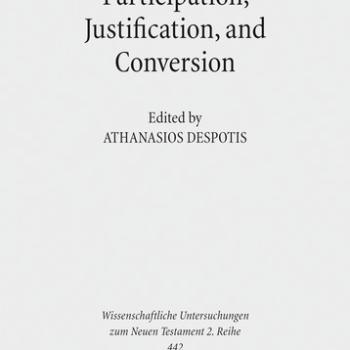Editors' Note: This article is part of the Patheos Public Square on The Spirituality of Children. Read other perspectives here.
One of the greatest champions of children's spirituality in history was Jesus. Jesus placed a child in the midst of the disciples, informing them that the Kingdom of God belongs to "such as these" and that whoever "does not receive the Kingdom of God like a child shall not enter it." (See Matthew 19, Mark 10, and Luke 18.) In this way Jesus made children "the pattern and paradigm of God's reign." (See John T. Carroll's Children in the Bible.) Furthermore the first person in history to greet and celebrate the advent of Jesus, God incarnate, was an unborn child — John the (not yet) Baptist in utero.
So, why was Jesus so keen for adults to welcome, learn from, and even become like children in order to belong to God's reign? And what are some of the things that make children's spirituality so valuable and distinct from adult spirituality?
The humility, vulnerability, and low status of children
Children lack high status and are vulnerable to the will and actions of others. They don't come to God or to our faith communities with pretensions of how important they are. They are naturally open and carefree in relation to God as they realize they have nothing to offer and everything to gain.
It is no coincidence that in all three gospel accounts, the story of the rich young ruler follows the story of Jesus welcoming the children. In the rich man's story we see a man unable to divest himself of status and possessions in order to follow Jesus freely, the opposite of the child who has nothing and responds to Jesus' welcome without question. This natural humility of children, coupled with an unashamed acknowledgement and expectation that they need to be helped and served, acts as a model of discipleship for adults. We are reminded that for Jesus the outsiders often become the center, the weak become the pattern for the strong, the dependent become the model for the "got-it-all-togethers."
The trusting dependence of children
Trust is the bedrock of the existence of children, who fundamentally need the care and nurture of others to survive and thrive. For children this poses no problem and thus a trusting dependence on God's grace is effortless and uncomplicated. Children are willing and able to accept God's love and goodness, and eagerly expect God's answers to prayer without caveat. Doubt and distrust are exceptionally adult "qualities" that become a challenge for us to unlearn in our relationship with a good God who lies beyond our understanding.
The openness and flexibility of children
A child's spirituality is not built on their depth of knowledge but on their openness and flexibility. They are used to not having all the information, and instead are accustomed to processing new information that changes their worldview constantly, flexibly adapting their lives according to it. They are not trapped by an adherence to the ways things have always been done or understood before. They are radically open to fresh insights and to the voice of God.
:::page break:::
Children as those who play and exist in the present
Schleiermacher observed the fact that children play and adults practice. Play is about an imaginative engagement in the present moment. Children are not concerned with utility — what will be useful or beneficial in the future — or interested in perfection or completion (all the reasons we adults practice), but are far more concerned with a joyful participation in all things. Children remind us that discipleship is about messy, enthusiastic participation rather than understanding or mastery.
The curiosity, wonder, and imagination of children
Children are naturally curious and filled with wonder. This wonder asks questions, and engages the imagination while simultaneously processing facts. To a highly rational adult, a child who is inquisitive and eager to understand what God is like, and unafraid to mix imagination with their discoveries and experiences, presents a holy challenge. The story of David and Goliath is an excellent example. According to the adult mindset of the Israelite troops the feared warrior simply cannot be faced. Into this mix comes the child, David, with his unwavering trust in God, coupled with the imagination to see Goliath as a bear or a wolf, thus representing no greater threat than a normal day looking after sheep. David has no need of adult armour or training. In fact these are the very things that would make his triumph impossible. His imaginative reinterpretation of the situation, alongside his trust, forms in him the courage and the way through that the adults cannot find.




